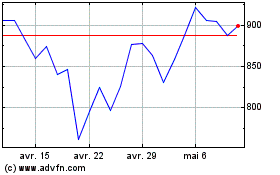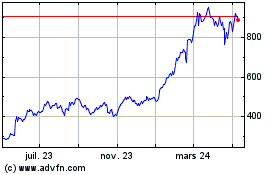SC24 -- NVIDIA today announced that global
pharmaceutical and techbio industry leaders, academic pioneers and
AI researchers are adopting the open-source NVIDIA® BioNeMo™
Framework to advance drug discovery and accelerate molecule design.
Researchers require specialized biomolecular models and datasets
that allow them to gather insights at scale to design therapeutics
faster. The open-source BioNeMo Framework offers a collection of
accelerated computing tools designed to exponentially scale AI
models for biomolecular research, bringing a new level of
supercomputing to biopharma.
“The convergence of AI, accelerated computing and expanding
datasets offers unprecedented opportunities for the pharmaceutical
industry, as evidenced by recent Nobel Prize wins in chemistry,”
said Kimberly Powell, vice president of healthcare at NVIDIA. “To
help unravel the complexities of biological systems, we’ve
introduced the open-source BioNeMo Framework, which will enable
researchers worldwide to accelerate the development of life-saving
treatments.”
Pioneering biotech companies, techbio researchers and AI
platform companies and organizations are already contributing or
will contribute to the open-source framework, including A Alpha
Bio; Argonne National Laboratory; Dyno Therapeutics; Genentech, a
member of the Roche Group; Ginkgo Bioworks; Relation; VantAI and
Weights & Biases. Key research leaders known for advancing
computational science also use the BioNeMo Framework to drive
innovation.
“Argonne has contributed billion-parameter biological models
that require specialized software to train across high-performance
computing environments,” said Arvind Ramanathan, computational
science group leader at Argonne National Laboratory. “With BioNeMo,
Argonne and the broader biotech community gain an enterprise-level,
open-source solution that enables researchers to easily scale the
training of large biological foundation models — in labs that
otherwise wouldn’t have the computational expertise to do so.”
Introducing the Next-Generation BioNeMo
PlatformThe end-to-end NVIDIA BioNeMo platform is designed
to accelerate AI model creation, customization and deployment for
drug discovery and molecular design. Seamlessly integrated with
accelerated computing infrastructure, it reduces costs, increases
scale and speeds up drug discovery workflows to provide fast,
reliable insights from biomolecular data.
In addition to the BioNeMo Framework, the platform supports
NVIDIA NIM™ — optimized microservices for secure, scalable AI
inference — and NVIDIA BioNeMo Blueprints, which are optimized
reference designs for wet-lab and computational workflows.
NVIDIA also announced a new collection of optimized, easy-to-use
NIM microservices for BioNeMo. The microservices can be deployed
quickly and easily on premises or in any data center or cloud. This
offers developers the flexibility to run applications across a
diverse range of environments and reduces the time from inference
to insights for biological drug discovery research.
The newly available NIM microservices support industry-leading
models, including:
- AlphaFold2 is a deep
learning model, developed by Google DeepMind, designed to transform
protein structure prediction. Researchers using the AlphaFold2 NIM
microservice for BioNeMo achieved a 5x speedup when predicting
protein structures in near real time.
- DiffDock 2.0 is based on MIT research and
trained on the gold-standard PLINDER dataset. With the DiffDock 2.0
NIM microservice, researchers were able to predict the orientation
of a molecule 6.2x faster and 16% more accurately.
- RFdiffusion and
ProteinMPNN NIM microservices help speed up the
process of designing novel proteins to bind with a target molecule
and enable the creation of new protein therapeutics.
BioNeMo now includes new acceleration libraries, including
cuEquivariance, that accelerate the mathematical computations
essential to DiffDock predictions for chemistry.
Companies can use NVIDIA BioNeMo Blueprints, a catalog of
customizable reference AI workflows, to help developers scale their
AI deployments as enterprise-grade production pipelines.
The BioNeMo Blueprint for virtual screening provides a
customizable, easy-to-follow workflow for using NIM microservices
to design small molecules faster, while saving time and costs.
More than 200 techbios, large pharma and startup users are
already integrating BioNeMo into their computer-aided drug
discovery platforms and workflows.
Global system integrators, software providers and cloud service
providers such as Accenture, AWS and Deloitte are bringing NVIDIA
BioNeMo Blueprints to enterprises worldwide.
About NVIDIANVIDIA (NASDAQ: NVDA) is the world
leader in accelerated computing.
For further information, contact:Janette
CiborowskiCorporate CommunicationsNVIDIA
Corporation+1-734-330-8817jciborowski@nvidia.com
Certain statements in this press release including, but not
limited to, statements as to: the benefits, impact, and performance
of NVIDIA’s products, services, and technologies, including NVIDIA
BioNeMo Framework, NVIDIA NIM, and NVIDIA BioNeMo Blueprints; third
parties using or adopting our products and technologies, the
benefits and impact thereof, and the features, performance and
availability of their offerings; the open-source BioNeMo Framework
enabling researchers worldwide to accelerate the development of
life-saving treatments; and pioneering biotech companies, techbio
researchers and AI platform companies and organizations
contributing to the open-source framework are forward-looking
statements that are subject to risks and uncertainties that could
cause results to be materially different than expectations.
Important factors that could cause actual results to differ
materially include: global economic conditions; our reliance on
third parties to manufacture, assemble, package and test our
products; the impact of technological development and competition;
development of new products and technologies or enhancements to our
existing product and technologies; market acceptance of our
products or our partners' products; design, manufacturing or
software defects; changes in consumer preferences or demands;
changes in industry standards and interfaces; unexpected loss of
performance of our products or technologies when integrated into
systems; as well as other factors detailed from time to time in the
most recent reports NVIDIA files with the Securities and Exchange
Commission, or SEC, including, but not limited to, its annual
report on Form 10-K and quarterly reports on Form 10-Q. Copies of
reports filed with the SEC are posted on the company's website and
are available from NVIDIA without charge. These forward-looking
statements are not guarantees of future performance and speak only
as of the date hereof, and, except as required by law, NVIDIA
disclaims any obligation to update these forward-looking statements
to reflect future events or circumstances.
© 2024 NVIDIA Corporation. All rights reserved. NVIDIA, the
NVIDIA logo, BioNeMo and NVIDIA NIM are trademarks and/or
registered trademarks of NVIDIA Corporation in the U.S. and other
countries. Other company and product names may be trademarks of the
respective companies with which they are associated. Features,
pricing, availability and specifications are subject to change
without notice.
A photo accompanying this announcement is available at
https://www.globenewswire.com/NewsRoom/AttachmentNg/1e0417ca-84c4-4cf3-aa18-a5260132bcc5
NVIDIA (NASDAQ:NVDA)
Graphique Historique de l'Action
De Nov 2024 à Déc 2024

NVIDIA (NASDAQ:NVDA)
Graphique Historique de l'Action
De Déc 2023 à Déc 2024
